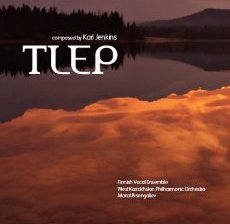
Image © Sony Classical 2006

Jenkins and the Finnish Vocal Ensemble
Image © Finnish Vocal Ensemble 2006
More Karl Jenkins:
Kiri Sings Karl (2006)
Adiemus Vocalise SK |
PV (2003)
Adiemus IV The Eternal Knot (2000)
Adiemus Website
|
|
(24 December 2006) Over the latest ten years or so, the phenomenal Welsh composer Karl Jenkins has successfully created memorable music that blentds several different musical genres together in highly interesting and unique ways, while not being too diverse, too modern or too atonal. On his latest recording, Tlep (Sony BMG Music Entertainment (UK) 828768 44252 4, 2006), we are offered a wonderful armchair trip to Kazakhstan, a small country between Europe and Asia that once was under the Soviet rule before gaining independency fifteen years ago. The title of the work, Tlep (pronounced "Klep"), refers to a person called Tlep Aspantaiuly, who was a famous composer and player of a violin-like, two-string instrument called the kobyz. During the Soviet rule, the Kazakh cultural tradition was near to extinction, as no-one was allowed to use their native language that is related to those languages spoken in Turkey. This obviously made the transfer of the rich cultural heritage for younger generations very difficult, if not impossible to certain extent, so it isn't until these days that the Kazakh language and the cultural identity have started to live again. Still, only five percent of the fifteen million Kazakh population have maintained Kazakh as their native language. One of the most active people in this cultural heritage restoration process has been Tlep Aspantaiuly's heir, Sapar Iskakov. Not only did he set up a foundation to support young Kazakh musicians, but he also has collaborated with the leader of West Kazakhstan Philharmonic Orchestra, Marat Bisengaliev, helping him to set up an international violin competition as well as making the Kazakh culture more known also abroad. Two years ago also Karl Jenkins joined forces with Marat, and the stunning release of Jenkins' Requiem marked the first ever album for the Kazakh orchestra to be released through a western record label. The orchestra then performed both Requiem and Jenkins' own work both in the UK and in Kazakhstan to great acclaim. Luckily this was not the end of the fabulous collaboration that had already been initiated, namely, later on Iskakov got in touch with Jenkins and persuaded him to compose a commission work that would honour his great ancestor Tlep and the Kazakh culture. So the seven-movement work for female chorus, a symphony orchestra and four percussionists was born. With a cornucopia of the Kazakh arts and music tradition to draw upon, the release of the Tlep album is a fabulous introduction to the cultural richness of the Kazakh people in general. As Tlep is a commissioned work, this means that all seven movements of it have been composed by Karl Jenkins. Obviously some degree of artistic liberty must be allowed here, but, at Jenkins has successfully handled the Kazakh influences with extreme care. Alongside the already mentioned kobyz instrument, Karl has included three other Kazakh folk instruments to his scoring; the saz syrnai which is somewhat akin to ocarina, the dombra which is similar to a two-string balalaika, and the shankobyz which is akin to a jew's harp. These all bring a great deal of authenticity and vibrancy to the music, making it to sound very genuine and coming straight from the passionate hearts of the musicians. Although recorded without the stunning vocals of Miriam Stockley as on Jenkins' Adiemus Vocalise (review) album, Tlep will still entice Adiemus enthusiasts with the characteristic multi-layered vocals performed here by the Finnish Vocal Ensemble (formerly the Finnish Adiemus Singers). Instrumental arrangements are lush and percussive and largely Adiemus in style. In addition to the use of a Kazakh orchestra, some Kazakh folk instruments and instrumentalists, the lyrics of the songs are original Kazakh as well. The source author for the texts is the revered 19th century philosopher and poet, Abai Ibragim Kunanbaiuly. One cannot but admire the fearless and very brave, unprejudiced attitude of the nine-strong Finnish vocal ensemble who have successfully been able to tackle with learning the extremely tricky phonetics of the Kazakh language, relying only on audio samples! The album also features contributions from soprano Aruhan Bisengaliev and Nigel Hitchcock on saxophone, both of whom have performed on prior Adiemus albums. Tlep offers the listener a very cohesive, but still yet versatile musical experience. At times the music is very filmic, for example in "Tulpar" one can almost see the winged horse galloping through the steppes when listening to the track, and on the other hand, one is reminded of the passing of the time very vividly in "Zamanai." The range of emotions vary from one song to another, following exactly the meaning of the lyrics. At one time there is joyous dancing as in "Bea," or love stories like in "Dudarai" and "Kozimnin Karasy" for example. In other words, every song has its own mood and own story to be unfold, and both the lyrics and the music always work in perfect harmony together. Obviously there are elements that are typical for Karl's composing style in general, but then again he really gives respect to the Kazakh elements as well. Therefore, it would be a big pity if this masterpiece would not receive a worldwide audience, may it be in terms of releasing the album or in terms of giving the work more live performances. From the very first listening, Tlep has proven to be a heroic deed, and it shows the world the great cornucopia that folk tradition can be, regardless of nation, and how this kind of a cultural masterpiece can become a vital part in restoring cultural identity that once was nearly vanished.--Suvi Kaikkonen in oulu, Finland and Russ Elliot in New York 
|






